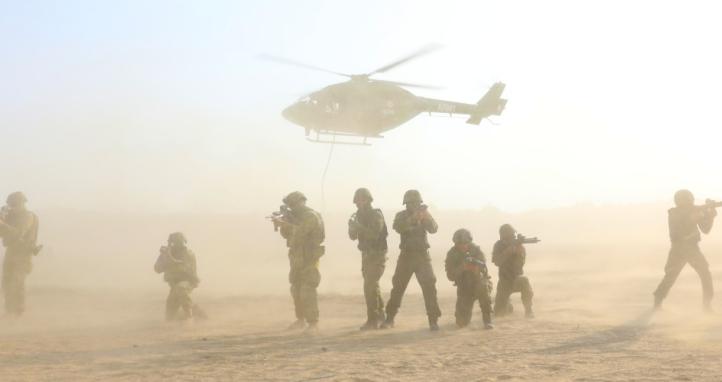Facts and figures
| Government type | Communist Party-led State |
| Notable people |
|
The 'Know Your Region' series is designed to support unit and individual professional military education on the South East Asian region. It's important for all serving members of our military to have a foundational knowledge of the countries and issues in the Indo-Pacific.
CHINA – DIPLOMACY
On this page:
- Summary
- Politics and the Chinese Communist party
- China and Australia
- China and the USA
- China and its neighbours
Summary
For more than two millennia, China saw itself as the cultural, political, and economic centre of the world. This has in many ways shaped China’s outlook on global governance—the rules, norms and institutions that regulate international cooperation. The decline and collapse of imperial China in the 1800s and early 1900s however, diminished Chinese influence on the global stage for more than a century. In the past two decades, China has re-emerged as a major power, with the world’s second largest economy and the world's largest standing army. It is increasingly seeking to assert itself in the international system and in global governance institutions. The relationship between China and the rest of the world is changing. What underpins China’s global push is President Xi Jinping’s commitment to transform China into a fully developed, industrial country and to advance Chinese power in the world. For Xi, it is time for China to have a place under the sun.
Politics and the Chinese Communist Party
The Chinese Communist Party (CCP) is the founding and ruling political party of modern China, officially known as the People’s Republic of China. The CCP has maintained a political monopoly since its founding nearly a century ago, overseeing the country’s rapid economic growth and rise as a global power.
For further reading on China's politics, see the resources below:
- Videos
- Podcasts
- Articles
- China’s State Organisational Structure
- PRC State Council: State Council News
- Interactive Chinese Government Organisational Chart
- After Xi: Future Scenarios for Leadership Succession
- China’s Political System and the extent of Democratic Participation
- What do overseas visits reveal about China’s Foreign Policy priorities?
China and Australia
After establishing diplomatic relations with the People's Republic of China in 1972, Australia established an embassy in Beijing in 1973. The Australia-China bilateral relationship is based on strong economic and trade interests, as well as longstanding community and cultural links. China is Australia’s largest trading partner, while Australia is a leading source of resources for China. Both sides acknowledge that Australia and China have different histories, societies and political systems, as well as different viewpoints on some important issues. Australia's diplomatic network in China includes the embassy in Beijing and consulates in Shanghai, Guangzhou, Chengdu, Shenyang and Hong Kong.
For a timeline of events to-date concerning Australia and China relations look here, and for further information see the resources below:
- Videos
- Podcasts
- Articles and sites
- The Dragon and the Kangaroo: 45 years of Australia-China relations
- Here’s what happened with China and Australia in 2020
- It Is So Difficult to be China's Friends in Australia Today (china-embassy.org)
- Australia and China: It’s complicated
- Great expectations: The unravelling of the Australia-China relationship
- Further resources
China and its Neighbours
China, ASEAN and other countries in the region are highly integrated. From an economic perspective, this is reflected in the rapid increase in trade and investment flows. Few countries in the world have such complex and complicated neighbourhood relations as China, which today shares land borders with 14 countries and has eight maritime neighbours. The rise of China presents new challenges and opportunities for the development of its neighbourhood relations and its regional strategies, some of which are explained in the videos below:
China’s broader strategic issues including Taiwan, Hong Kong, and Tibet will be presented in a separate feature within the Know your Region content. Links and articles below will give a brief overview of China’s relationships with some of its other neighbours, which have been selected specifically to highlight regional dynamics, relevant events, and historic and current relationships:
- India
- Country information: CIA World Factbook - India
- Country information: DFAT Country brief - India
- Video: What is the dispute between China and India all about?
- Video: China and India: How economically linked are they?
- Video: Trouble with China-India ties
- Further reading: ASPI – China India
- Further reading: The Diplomat: China India relations
- Indonesia
- Country information: CIA World Factbook – Indonesia
- Country information: DFAT Country brief – Indonesia
- Video: China-Indonesia cooperation thrives under Belt and Road Initiative
- Video: China’s fishing vessels withdraw from disputed territory
- Video: One-on-one with Indonesia’s Ambassador to China
- Video: Gravitas: Stand-off in South China Sea: Indonesia’s stern message to China
- Further reading: The Diplomat: China Indonesia relations
- Laos
- Country information: CIA World Factbook – Laos
- Country information: DFAT Country brief – Laos
- Video: How is China’s Silk Road transforming Vietnam and Laos?
- Further reading: The Diplomat: China Laos relations
- Malaysia
- Country information: DFAT Country brief – Malaysia
- Country information: CIA World Factbook – Malaysia
- Video: Malaysian PM says the country is now closer to China than the US
- Video: Malaysia’s importance to China is ‘underplayed’
- Video: Malaysia’s Foreign Minister says South China Sea still a major unresolved issue
- Video: Malaysia has benefited from US China trade war
- Further reading: The Diplomat: China Malaysia relations
- Mongolia
- Country information: DFAT Country brief – Mongolia
- Country information: CIA World Factbook – Mongolia
- Country information: Inner Mongolia Autonomous Region
- Video: Why is there a Mongolia in China?
- Video: How is China’s Belt and Road Initiative transforming Mongolia?
- Further reading: The Diplomat: China Mongolia relations
- Myanmar
- Country information: DFAT Country brief – Myanmar
- Country information: CIA World Factbook – Burma (Union of Myanmar)
- Video: The history of Burma (documentary)
- Video: Why won’t China call the Myanmar a coup?
- Video: China blocks UN condemnation of Myanmar coup
- Video: Why China wants a foothold in Myanmar
- Video: Clashes between Myanmar military & armed civilians
- Video: Is Myanmar a failed state?
- Further reading: ASPI – China Myanmar
- Further reading: The Diplomat: China Myanmar
- North Korea (Democratic People’s Republic of Korea)
- Country information: DFAT Country brief – North Korea
- Country information: CIA World Factbook – North Korea
- Video: An inconvenient border: Where China meets North Korea
- Video: China and North Korea – the story behind their (complicated) friendship (2017)
- Podcast: An insider’s view of North Korea
- Podcast: An audience with a North Korean defector
- Further reading: ASPI – China North Korea
- Further reading: The Diplomat: China North Korea relations
- Philippines
- Country information: DFAT Country brief – Philippines
- Country information: CIA World Factbook – Philippines
- Video: The History of the Philippines in 12 Minutes
- Video: ‘Will send navy ships in South China Sea to assert claim’ – Duterte
- Video: Philippines sounds alarm over 200 ships in the South China Sea
- Further reading: The Diplomat – China Philippines relations
- Russia
- Country information: DFAT Country brief - Russia
- Country information: CIA World Factbook – Russia
- Video: China – Russia look to deepen ‘best in history’ ties
- Video: China Russia stand ‘back to back’
- Video: Russia and China special relationship
- Video: Unpacking the Russia-China alliance
- Podcast: China Russia relations at the dawn of the Biden era
- Further reading: ASPI – China Russia
- Further reading: The Diplomat: China Russia relations
- Singapore
- Country information: DFAT Country brief – Singapore
- Country information: CIA World Factbook – Singapore
- Video: Singapore PM Lee calls on US to form constructive alliance with China
- Video: ‘Very hard’ for countries to choose sides between US and China
- Video: 30 years of Singapore China relations – 3 joint projects
- Video: Foreign Ministers of Singapore and China meet in SE China
- Further reading: The Diplomat: China Singapore relations
- Vietnam
- Country information: DFAT Country brief - Vietnam
- Country information: CIA World Factbook - Vietnam
- Video: The history of Vietnam in 8 minutes
- Video: China Vs Vietnam – the new race of the century
- Video: South China Sea tensions – Foreign Ministers of Vietnam & China virtual meeting
- Further reading: ASPI – China Vietnam
- Further reading: The Diplomat: China Vietnam relations
China and the United States of America
As highlighted in the 2023 Defence Strategic Review and 2024 National Defence Strategy, strategic competition, primarily between the United States and China, will be the principal driver of strategic dynamics in our region. As of 2024, the United States has the world's largest economy and China has the second. Historically, relations between the two countries have generally been stable with some periods of open conflict, most notably during the Korean War and the Vietnam War. Strategic competition between the United States and China is unlikely to abate in the near term.
For further information on China's relationship with the United States, see the resources below:
- Videos
- Podcasts
- Articles
- Further reading
Discussion Questions
- The current relationship between China and the US may impact the economic and military decisions of ASEAN nations. What sort of decisions will the ASEAN countries likely face, and how will this impact the stability of the region?
- The relatively young ages of both modern China and India has seen the world’s two most populous nations predominantly focus on internal and close regional matters as their economies and militaries grew. Now that they both seek to exert greater influence on the world stage, what will the impact of this be for South East Asia, and what role should Australia play both diplomatically and militarily?
- The Russian and Chinese relationship is a complex one that is often misunderstood and overlooked by western nations. What sort of relationship will China seek to have with Russia over the next decade, and how will that impact US and Australian influence in the Indo-Pacific?
- The documentary ‘How Xi Jinping changed China and the Communist Party’ suggests that China’s Belt and Road initiative could potentially link up to a third of the world’s countries, with China at the centre. What do you think could be some of the impacts on both regional and global dynamics with this initiative?
Last Reviewed 09/2024
Know your region
Know Your Region series gives you a shortcut to understanding other nations in the Indo-Pacific region.









